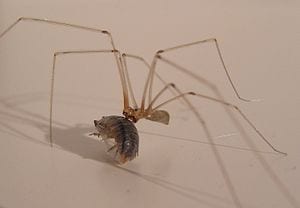Malaria could be curtailed by the creatures
Property owners who need to banish destructive woodworm could have an eight-legged alternative to chemical sprays that are potentially dangerous and only partially effective. They could enlist the aid of very special spiders that will seek and devour the destructive grubs. And a further, exciting possibility is that malaria could be curtailed by the creatures.
Research by sustainable architecture experts at the University of Huddersfield is showing that a spider named Pholcus phalangioides — sometimes known as the cellar spider — is very effective at killing off woodworm in old buildings and now there are plans to devise special nesting boxes for the creatures.But the Pholcus — which actively hunts its prey instead of simply lurking in a web — could be an even bigger boon.
Lecturer Charles Hippisley-Cox, who is pioneering the research, has noticed that these spiders will also eat mosquitoes”This could have global significance, because if we can tackle mosquito populations with this spider and design something that will house these spiders in appropriate places, we could reduce the threat of malaria.
This is probably the most exciting aspect of the project,” he says.But it was the work done on the restoration of old buildings by Mr Hippisley-Cox and his colleagues in a sustainable architecture research group at the University of Huddersfield which revealed the potential of the wispy-legged but voracious Pholcus phalangioides.Mr Hippisley-Cox, a historic buildings specialist, and his colleagues have been experimenting with restoration techniques in a part of France where derelict old buildings are plentiful and relatively inexpensive.
It is mandatory in France to use chemicals to treat woodworm. But not only were the sprays a potential health hazard, but it was impossible to achieve 100 per cent effectiveness.”After spraying, the building seemed to be lifeless, ” said Mr Hippisley-Cox.
via Science Daily
The Latest Streaming News: spiders biological control updated minute-by-minute








